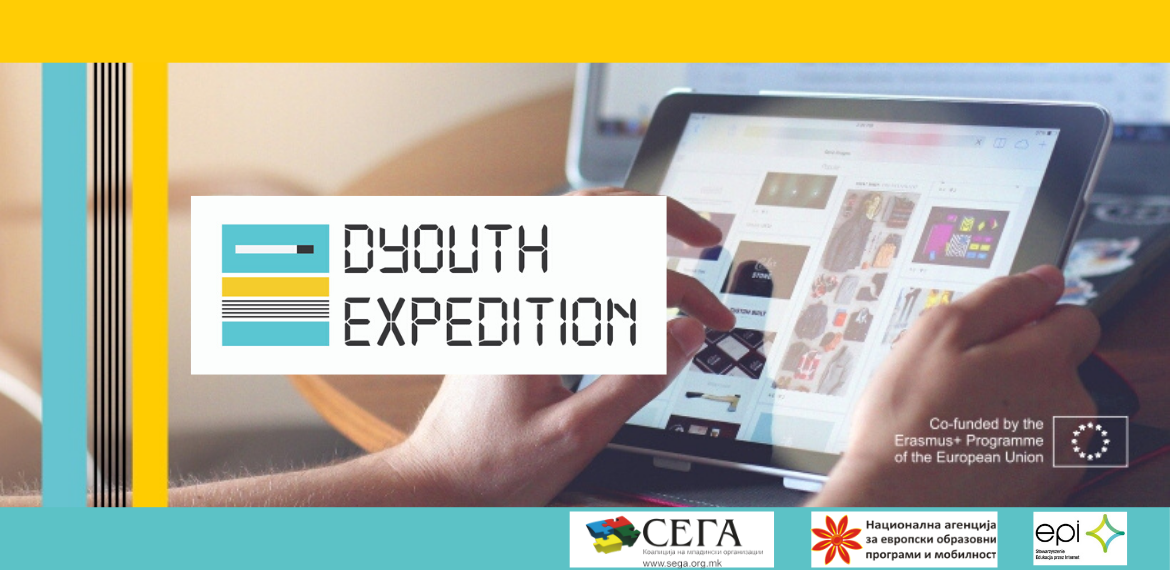
DYOUTH Expedition
Start: 01-09-2019 - End: 31-05-2020
Project Reference: 2019-2-MK01-KA205-060550
EU Grant: 11844 EUR
Young people are the key to the future of Europe and represent a huge potential for innovation in the labor market leading to an improvement in Europe’s competitiveness and, thus, economic recovery. It is in the young generation that we find the ‘digital natives’ who approach digital technologies without deference, and who have a keen sense for the new opportunities provided by these technologies. In 2018, more than 5.5 million young people (15-24 years) were neither in employment nor in education or training (NEET) in EU and there were 11% of early school leavers. According to Eurostat, Young people neither in employment nor in education and training aged 15-29, total unemployment rate in Macedonia for 2015 is 32.5%, compared Poland 14.6% and EU28 14.8%. As a result, political attention has increasingly been focused on boosting the employment of young people in Macedonia through a combination of employment, education and social assistance policies.
Promoting youth entrepreneurship is one response to the challenges portrayed above. The policy rationale for attaching high hopes to such efforts is that if young people can be empowered to take charge of their own lives and careers, and if they can change their attitude towards initiative and learn how to seize opportunities. National governments have launched considerable efforts to pursue the objective of promoting entrepreneurship among young people, and initiatives to boost youth entrepreneurship are given a significant role in supporting the main goals of the Europe 2020 strategy for growths and jobs.These initiatives have mainly focused on strengthening the capacity of formal education systems to provide pupils and students with entrepreneurial and innovative skills, attitudes and values. There is a growing realization that entrepreneurial attitudes and values are often achieved outside the formal education system through youth work (including self-organised projects by young people). In this sense, youth work presents itself as a promising opportunity for combining traditional approaches to the promotion of innovation and entrepreneurship with work targeting disadvantaged groups of young people and aiming at social activation and inclusion. Youth work appears to offer untapped potentials for developing the resources of NEETs through activities conducted by youth workers in a supportive setting. The needs of youth workers on the other side is crucial to understand how digitization is shaping the societies, including its impact on youth work and on young people. Youth workers needs to be able to take young people's digital cultures into account in youth work practices.
The project "DYOUTH Expedition" will bring together consortium consisted of partners from Macedonia and Poland that will work on enhancing the quality of digital youth work in prevention of NEET among youth through exchange of best practices for combining both offline and online methods in entrepreneurial learning. The overall aim of the project is to: Increase quality of digital youth work in empowering youth to become active citizens in the society. Through the project partners will strive to achieve the specific objective of the project to: Exchange of best practices through producing e-learning toolkit for enhancing entrepreneurship among youth as a sustainable and valuable tool for prevention of social exclusion of youth. From one side the project involves national network of youth organizations with significant experience in promotion of entrepreneurship in Macedonia, while on the other hand we have organization from Poland which mission is to promote and practice education through internet. Both partners committed to share their experiences and best practices in their field of expertise in order to develop useful product for youth workers that will provide methodology for implementing workshops in entrepreneurship with combining offline and online methods, thus promoting use of digital youth work and ITC.
Project foresees LTTA that will gather youth workers from Macedonia and Poland that will learn form the best practices and experiences of their colleagues from both countries. This activity will contribute in developing feasible and realistic youth work services to young people especially those endangered of becoming NEETs. The impact of this training will be well creation and piloting of new e-learning tool DYOUTH expedition for youth workers in order to and provide high quality youth work services to the young people in NEET situation. 140 local youth from Poland and Macedonia will attend workshops in entrepreneurship.
The E-Learning Toolkit for enhancing entrepreneurship among youth will contribute in enhancing the sustainability of the youth organizations involved, and will be disseminated to over 5000 youth workers in Europe.

